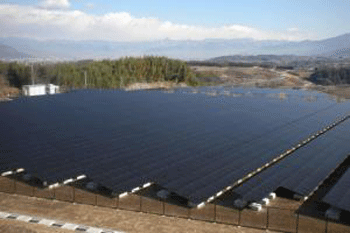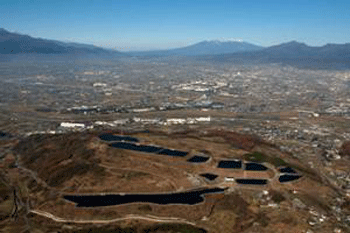- News
20 February 2012
Japan’s Mt Komekura PV project activated after Solar Frontier supplies 10MW of CIS modules
 Tokyo-based Solar Frontier (a subsidiary of Japanese energy business Showa Shell Sekiyu K.K.) says that its president Shigeaki Kameda attended a ceremony on 27 January to activate the Mt Komekura Solar Power Plant in Yamanashi Prefecture, central Japan. Solar Frontier supplied 10MW of CIS (copper indium selenium) thin-film photovoltaic (PV) modules to the plant through Meidensha Corp. Operated jointly by Yamanashi Prefecture and Tokyo Electric Power Company (TEPCO), the facility is among the largest solar power plants in Japan.
Tokyo-based Solar Frontier (a subsidiary of Japanese energy business Showa Shell Sekiyu K.K.) says that its president Shigeaki Kameda attended a ceremony on 27 January to activate the Mt Komekura Solar Power Plant in Yamanashi Prefecture, central Japan. Solar Frontier supplied 10MW of CIS (copper indium selenium) thin-film photovoltaic (PV) modules to the plant through Meidensha Corp. Operated jointly by Yamanashi Prefecture and Tokyo Electric Power Company (TEPCO), the facility is among the largest solar power plants in Japan.
The plant has been built as part of Yamanashi Prefecture’s Global Warming Countermeasures Plan for cutting greenhouse-gas emissions. It is expected to generate about 12 million kWh of electricity annually (equal to the electricity use of about 3400 households) and reduce annual CO2 emissions by about 5100 tons (equivalent to the emissions of 1000 households). Electricity generation data for the plant, updated every 5 minutes, is available on TEPCO’s website in Japanese (www.tepco.co.jp/csr/renewable/megasolar).
 Solar Frontier claims that its PV modules have achieved a higher conversion efficiency rate than many other thin-film modules, and are able to deliver higher overall energy output (kWh) under real weather conditions. In Japan, the performance of CIS PV modules has already been demonstrated at the Yukigunigata Megasolar power plant in Niigata Prefecture and at large-scale solar power production facilities at Solar Frontier’s CIS module production plants in Miyazaki. Solar Frontier says that, as it proves the performance of its CIS modules, the panels are being adopted in more utility-scale solar power plants in Japan and around the world.
Solar Frontier claims that its PV modules have achieved a higher conversion efficiency rate than many other thin-film modules, and are able to deliver higher overall energy output (kWh) under real weather conditions. In Japan, the performance of CIS PV modules has already been demonstrated at the Yukigunigata Megasolar power plant in Niigata Prefecture and at large-scale solar power production facilities at Solar Frontier’s CIS module production plants in Miyazaki. Solar Frontier says that, as it proves the performance of its CIS modules, the panels are being adopted in more utility-scale solar power plants in Japan and around the world.
Solar Frontier started operation of all production lines at its gigawatt-scale Kunitomi Plant in Miyazaki in 2011, becoming one of the world’s largest solar module factories. The firm says that, due to its large-scale production enterprise, it will be able to supply increasing demand for solar power in Japan (as a result of the enactment of feed-in-tariffs this July) while continuing to supply customers around the world.
Solar Frontier CIS thin-film PV modules
